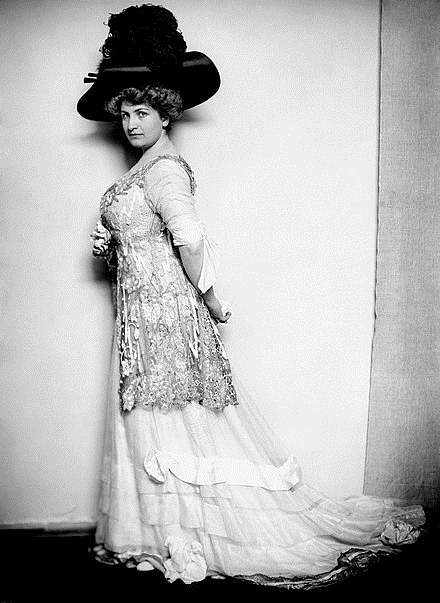Alma Mahler
by Roger Kaza
Today, music that blooms forth. The University of Houston presents this program about the machines that make our civilization run, and the people whose ingenuity created them.
By now we're all familiar with the #MeToo movement, women who have endured and reported sexual abuse or harassment. But maybe we need another movement, call it #SheToo. It would shine light on women overlooked by history because of the notoriety of the male figures in their lives: their brothers, or fathers, or husbands. I'm thinking of Mary Shelley, or Fanny Mendelssohn, or Blanche Ames, to name but a tiny few. Alma Mahler could easily join this esteemed group. My own picture of her for years consisted of little more than knowing she was married to three great creative geniuses of the early 20th century, composer Gustav Mahler, architect Walter Gropius, and writer Franz Werfel. But Alma Schindler, to use her given name, was herself a composer of originality and promise. Listen to this excerpt from her song, In meines vaters garten.
(In meines vaters garten)

Alma Mahler in 1909
Photo Credit: Wikipedia.
The text is "in my father's garden, Bloom, my heart, bloom forth!" Alma's father and step-father were both painters. Her childhood world was filled with the visual arts, but Alma chose music instead and became a talented pianist. She studied composing with Alexander von Zemlinsky, and her work, mainly songs, is imbued with the golden hue of fin-de-siecle Europe. Harmonies are complex, ambiguous, in flux. Structure and form are subservient to feeling. The text of the song is mirrored in the music. Here's one called Bei Dir ist es traut.
(Bei Dir ist es traut)
This text, by Rainer Maria Rilke, says, "Come, Tell your love to me, but not too loudly!" Maybe it was a prophetic line. In 1902 Alma married Gustav Mahler. She purportedly did not like his music. It was worse on his end: he didn't know her music well enough to like or dislike it, but he apparently forbade her to compose. He said it would be "ridiculous" to have two composers in one household. In a sense, he wanted Alma to "tell her love" to him, but not too loudly, as she might have as an equal, a working creative artist. So Alma Mahler quit composing in her thirties. She wrote at least 50 songs, but only 17 survive.
I would love to hear the other 33. I would love to hear more from this passionate woman once called Die Windsbraut, the Bride of the Wind. Alma outlived Mahler by more years than he had lived. She survived two World Wars, escaped the Nazis by crossing the Pyrenees on foot, and made the United States her final home. May her music now find its home.
(In meines vaters garten)
I'm Roger Kaza, from the University of Houston, where we're interested in the way inventive minds work.
Mahler's letter to Alma regarding her future as a composer:
Before we speak again you must renounce everything superficial. All vanity and outward show concerning your individuality and your own work. Would it be possible for you to regard my music as your music from now on. As for your music, I prefer not to discuss that in detail right now. But how can you imagine both husband and wife being composers? Have you any idea how ridiculous and degrading such a rivalry would become. You must become the person I need if we are to be happy together - my wife, and not my colleague.
- Gustav Mahler
Alma Mahler-Werfel (her final name) has received considerable attention in recent years. There are several biographies, and an interesting 2001 movie, Bride of the Wind, starring Sarah Wynter. Here are a sampling of online articles:
https://mugi.hfmt-hamburg.de/en/Artikel/Alma_Mahler.html
https://www.wpr.org/alma-mahler-malevolent-muse-or-early-feminist-composer
https://www.whatshernamepodcast.com/alma-mahler
https://gustavmahler.com/alma-mahler.html
https://www.alma-mahler.at/engl/almas_life/almaunddiemusik.html
The recordings used in this episode come from Alma Mahler-Werfel, Complete Songs. Iris Vermillion, mezzo-soprano, Cord Garben, piano.
Thanks to Kate Klise for her counsel and assistance with this episode.
This episode was first aired on March 23, 2021